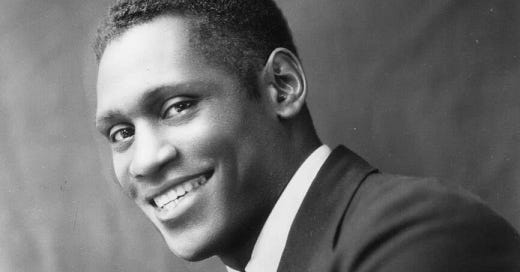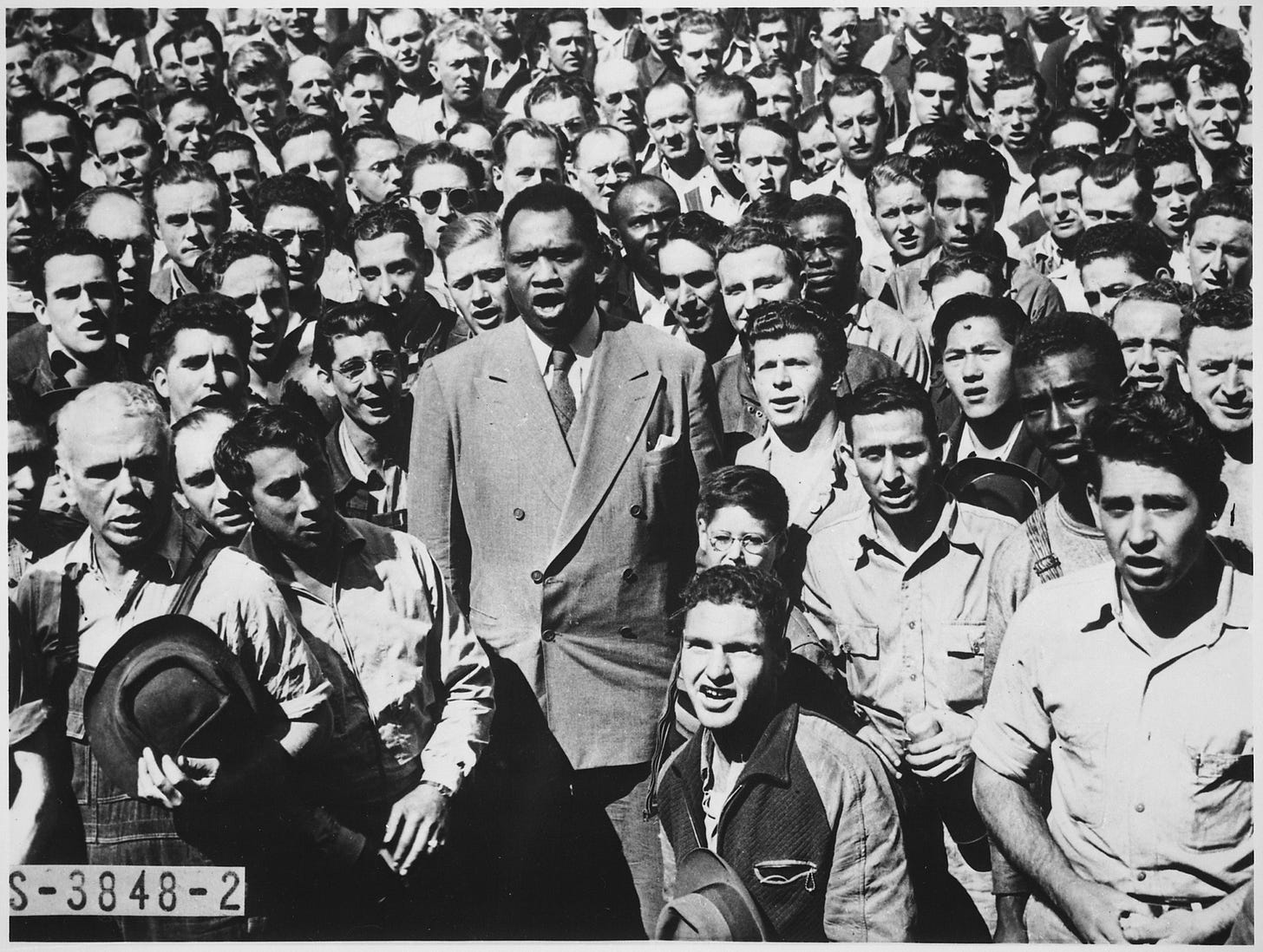Black Film Archive is a living register of Black films from 1915 to 1979. This Substack is its blog. Subscriptions help sustain the site and blog. Thank you for your support and encouragement.
The Major Voice. The adult Voice forgoing Rolling River, forgoing tearful tale of bale and barge and other symptoms of an old despond. Warning, in music-words devout and large, that we are each other's harvest. We are each other's business. We are each other's magnitude and bond. - Gwendolyn Brooks, "Paul Robeson"
Throughout my lifetime, the luminous actor Paul Robeson has been a visitor to my heart, mind, and television screen. The phrase ‘towering figure' is often thrown around, obfuscated from its intent to illustrate a person beyond comprehension and somehow among humanity, but no phrase could be more apt for Paul Robeson. One could point to his unprecedented accolades to exemplify this (A star athlete with 14 varsity letters, award-winning orator, valedictorian at Rutgers University, professional football player, master of over ten languages, lawyer, award-winning singer, et al.). But his genius lies in the fact that his beliefs were at the core of everything he did, even when that genius made him fall out of favor with the American public. He refused to allow his celebrity to be used as a weapon against Black Americans. Few can muster that kind of magnificent courage for a moment, even fewer for a lifetime of acting upon it. Paul Robeson's triumph reminds us that art without courage is simply work. If you're looking to learn more about Paul Robeson's artistry, check out this 1979 documentary narrated by Sidney Poitier.
By 1930, Robeson's concerts and radio appearances catapulted him to stardom on the international stage. In this moment of upheaval — from the rising power of fascism to the market crash of 1929 — Robeson was performing in concert halls worldwide. When the Major Voice returned to America in 1939 after World War II broke out in Europe — where he exiled to in the 1920s, searching for opportunities not available to him in America — Robeson exclaimed that he effectively retired from film acting at the peak of his career. This watershed moment comes after his noted discontentment with "Sanders in the River" (1935), a film celebrating the British Empire that Robeson tried to ban from ever being shown again. Cinema is a space where we share, develop, and reflect our belief systems. Robeson expressed that his celebrity could no longer be used in film to enforce the idea that Black people are subhuman.
I thought I could do something for the Negro race in films, show the truth about them and other people, too. I used to do my part and go away feeling satisfied, thought everything was O.K. Well it wasn't. The industry was not prepared to permit me to portray the life or express the living interests, hopes and aspirations of the struggling people from whom I come. You bet they will never let me play a part in a film in which a Negro is on top.
While abroad, Robeson became a champion of international working-class solidarity, an embodiment he brought back home. For the famed actor and singer, returning home coincided with interlinking his life and art to the growing labor movement and developed the persona of the 'people's artist' committing himself to the liberation of oppressed people around the world. While he continued singing in concerts and acting on stage, he also filled his schedule with singing and speaking at union rallies. At a 1941 rally, he expressed:
The Negro Problem cannot be solved by a few of us becoming doctors and lawyers. The best way my race can win justice is by sticking together in progressive labor unions.
Robeson's political activity made him a prime target for the budding crusade against communism in the 1940s. In 1946, Robeson demanded President Truman enact an anti-Lynching bill after 4 Black people were lynched by a white mob and founded the American Crusade Against Lynching. When Paul Robeson was asked to speak at the 1949 Paris Peace Conference, he was disparaged in the United States as a traitor to American idealism by expressing the following:
We in America do not forget that it is on the backs of the poor whites of Europe and on the backs of millions of Black people the wealth of America has been acquired. And we are resolved that it shall be distributed in an equitable manner among all of our children, and we don't want any hysterical stupidity about our participating in a war against anybody, no matter whom. We are determined to fight for peace.
The NAACP issued formal comments against Paul Robeson's statement and a few days later The New York Times published "The Case of Paul Robeson," stating "Paul Robeson will do himself and the cause of the American Negro a disservice if he carries out his resolution not to sing again but to devote his life to making speeches." Several months later, Jackie Robinson testified against him to the House Un-American Activities Committee to denounce Robeson as a Black leader. The backlash against Robeson was immediate. He was blacklisted, denied a passport, and unable to travel for work. His passport was eventually reinstated in 1958, and he began to embark on a worldwide comeback tour.
The revolutionary life of Paul Robeson should be celebrated alongside his triumphant career. The ongoing contextualization of his life and career are unending reminders that the work of the past is never done and never final. But he said it best:
Hell, 15 years ago, I could have boasted that I personally was the most fortunate Black man in the world. I had everything. But hell, man, what about my people? What about 10 million Negroes in the South? It's like I told Congressman Francis E. Walter; sure I was a concert idol and Jackie Robinson was a baseball hero, but nobody is going to use our success to make me forget about the masses of my people who've had the white man's foot on their necks for 300 years. - Paul Robeson to Ebony Magazine in 1954




Maya thank you for such a thought-provoking article, you are a real treasure, educating people of the past.
Never knew this about Paul Robeson. Thanks for sharing.